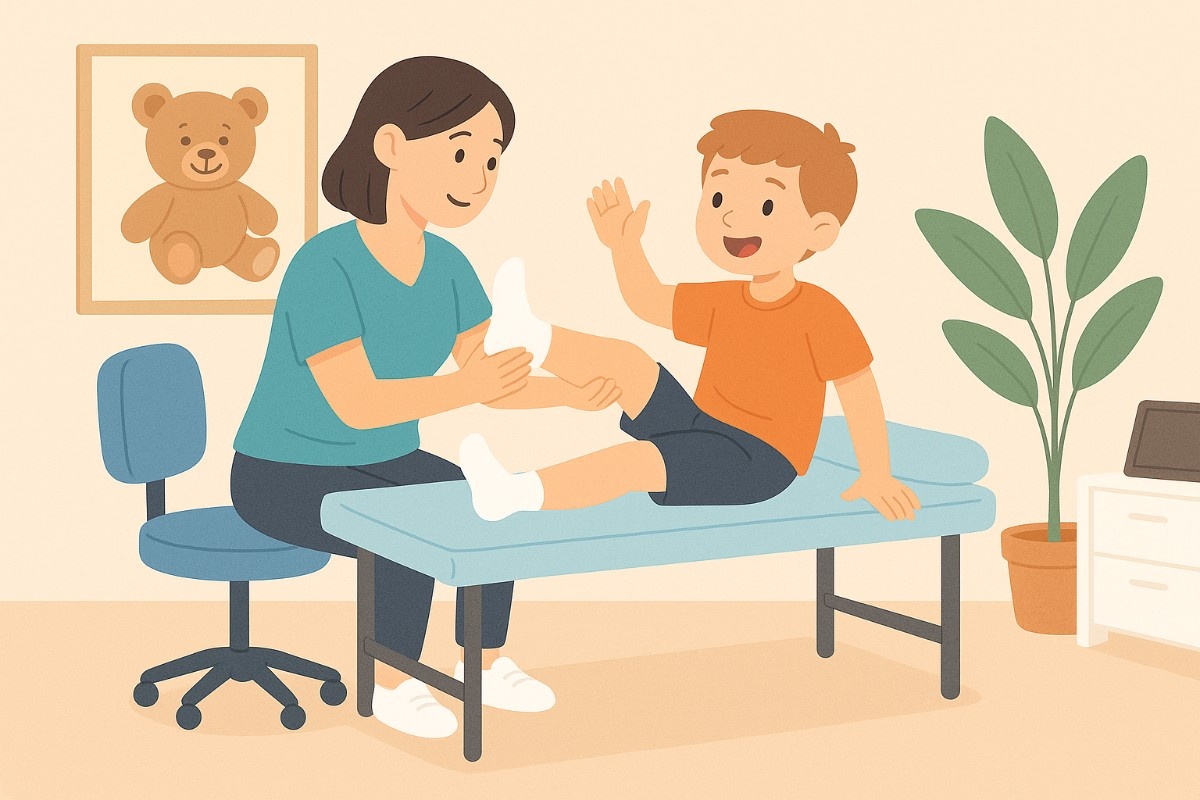The specialized field of paediatric physiotherapy concentrates on assessing and treating developmental, neuromuscular, skeletal and congenital conditions in infants and adolescents. The goal is to enhance physical abilities in children while promoting functional independence alongside supporting their complete growth and development.
Paediatric physiotherapy demands specialized knowledge of children’s growth patterns and development stages alongside understanding how physical impairments influence their everyday activities and interactions in play and learning contexts. Physiotherapy extends beyond treatment as it focuses on developing the child’s abilities and building a base for lifelong health.
Paediatric therapy needs to incorporate play-based methods that motivate children while being family focused and suitable for their developmental stage. Paediatric physiotherapists are essential in early intervention because they detect problems early and design preventative strategies to reduce future complications.
Importance of Paediatric Physiotherapy
Physical disabilities or developmental delays in children can lead to difficulties with movement and balance which affects their ability to perform basic daily activities including sitting and walking. Early and regular physiotherapy can help:
Physiotherapy helps stop the development of muscle tightness and joint stiffness complications.
Encourage proper motor development.
Paediatric physiotherapy facilitates independence and active involvement within educational and leisure pursuits.
Physiotherapy can enhance both the child’s life quality and self-assurance.
Common Conditions Treated in Paediatric Physiotherapy
Paediatric physiotherapists treat a broad spectrum of conditions such as:
Cerebral Palsy
Down Syndrome
Spina Bifida
Muscular Dystrophy
Developmental Coordination Disorder (DCD)
Autism Spectrum Disorders (ASD)
Torticollis and Plagiocephaly
Congenital limb deficiencies
Lack of timely motor development milestones (like delayed walking or crawling)
Post fracture and postsurgical recovery in children
Goals of Paediatric Physiotherapy
Paediatric physiotherapy focuses on helping children achieve their complete physical capabilities. The precise goals for paediatric physiotherapy treatment differ based on each child’s specific condition and age but generally encompass several standard objectives.
1. Promote Normal Motor Development
Children who have neurological or musculoskeletal impairments tend to show delayed achievement of developmental milestones including rolling, sitting, crawling, and walking. Through therapeutic activities paediatric physiotherapists support children’s motor development to match agerelated milestones.
2. Improve Strength, Balance, and Coordination
Kids who experience low muscle tone or motor control problems struggle with movement and maintaining stability. Therapeutic approaches combine physical exercises with playful activities to improve children’s muscle strength along with their balance and coordination abilities.
3. Enhance Mobility and Independence
The primary aim of treatment is to teach children to move on their own using walking skills, wheelchair mobility or other devices. Children gain selfassurance through increased independence which decreases their need for caregiver assistance.
4. Correct Postural and Musculoskeletal Abnormalities
Physical therapists work with patients who have scoliosis, flat feet, or improper posture. Intervening early helps avoid future complications while enhancing body alignment.
5. Reduce Pain and Prevent Deformities
Physiotherapy helps individuals with cerebral palsy or muscular dystrophy manage pain while preventing contractures and reducing skeletal deformity risks.
6. Educate and Involve Families
Family participation is central to paediatric physiotherapy. Parents receive education about their child’s condition along with home exercises and care techniques to extend their progress beyond clinic sessions.
7. Facilitate Participation in School and Play
Children need participation in ageappropriate activities such as sports and group play for proper social development and emotional health.
Scope of Paediatric Physiotherapy
Paediatric physiotherapy continues to grow in scope due to greater awareness of developmental disorders along with rising childhood disability diagnoses and worldwide shifts to inclusive education and healthcare systems. The scope encompasses several main categories.
1. Neonatal and Infant Care
Paediatric physiotherapists provide care for premature babies and infants with birth defects in neonatal intensive care units (NICUs). Professionals observe infant reflexes while evaluating muscle tone and readiness for eating and moving. Atrisk infants achieve better outcomes through early intervention measures.
2. Early Intervention Programs (0–3 Years)
Early childhood presents a vital period for both brain development and motor skills advancement. Physiotherapy during this stage proves most beneficial for children with developmental delays or disabilities through playbased motor therapy and sensory integration along with parent training.
3. School-Age Physiotherapy
Physiotherapy helps older children maintain classroom engagement and physical education performance while improving their ability to navigate school environments. The program tackles writing posture problems and attention deficits along with fatigue management in children affected by juvenile arthritis and muscular dystrophy.
4. Orthopedic Paediatric Physiotherapy
Physiotherapy helps children with fractures and joint injuries or congenital orthopedic conditions such as clubfoot to recover from their injuries by promoting healing and joint alignment while restoring their normal movement capabilities.
5. Neurological Paediatric Rehabilitation
Physiotherapy is essential for children diagnosed with cerebral palsy, traumatic brain injury, or genetic neurological conditions to help them maintain or enhance their functional abilities over time. Therapeutic interventions for neurological paediatric rehabilitation typically involve neurodevelopmental therapy (NDT), functional electrical stimulation (FES) and mobility training.
6. Community and HomeBased Services
Physiotherapy for children who have severe disabilities or mobility limitations can be provided at their homes or through community health programs. Through this approach therapists maintain an ongoing treatment process which allows patients to incorporate therapeutic exercises into their everyday activities.
7. Aquatic Therapy and Sensory Integration
Paediatric physiotherapists implement waterbased therapy and sensoryfocused exercises to help children with autism spectrum disorder and sensory processing challenges. Specific therapeutic modalities improve both engagement and therapy results when applied to particular patient groups.
8. Assistive Device Assessment and Training
Paediatric physiotherapists perform essential assessments to determine the need for mobility aids and adaptive equipment while providing training for their proper use including orthotics like AFOs and prosthetics.
Therapeutic Approaches in Paediatric Physiotherapy
Paediatric physiotherapy sessions create enjoyable interactive experiences that suit each child’s developmental stage. Techniques often include:
Play Therapy involves making exercise sessions engaging through the use of toys, games, and music.
Taping and bracing serves as a method to provide support for muscles and joints.
Stretching exercises and strengthening workouts are aimed at improving flexibility and building muscle strength.
Children with autism or sensory processing disorders benefit from SensoryMotor Integration therapy.
Modern tools such as Virtual Reality and Robotics help enhance motivation while delivering precise movement training.
Work Settings and Career Opportunities
Paediatric physiotherapists provide their services in numerous settings such as:
Hospitals and NICUs
Paediatric rehabilitation centers
Special schools and inclusive education settings
Early intervention programs
Private clinics and therapy centers
Homebased care services
Nongovernmental organizations (NGOs) focused on disability support
Paediatric Physiotherapy creates meaningful change through its compassionate practice which enables children to conquer physical obstacles and achieve their maximum potential. Paediatric physiotherapy provides not only treatment but also supports children to live with participation and dignity and achieve independence. The field of paediatric physiotherapy expands continuously due to increased public awareness and improved diagnostic tools along with advanced therapeutic methods which solidify its critical role in child healthcare.
Paediatric physiotherapists treat the body while supporting children’s physical, emotional, and social development throughout their growth stages.
– Dr. Vaibhav Dave, Head of Department
Department of Physiotherapy, Madhav University

